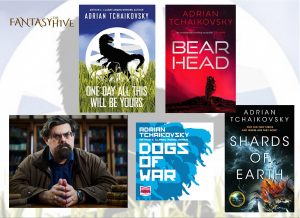Talking Dogs: Interview with ADRIAN TCHAIKOVSKY
We’re thrilled to welcome guest contributor Lucy Nield to the Fantasy Hive.
Lucy is a PhD student in the Department of English Literature at the University of Liverpool, where she is researching animals in speculative fiction. Today, she shares with us her interview with Adrian Tchaikovsky:
Talking Dogs with Adrian Tchaikovsky
Lucy Nield PhD Candidate, University of Liverpool. @lucy_nield1
ADRIAN TCHAIKOVSKY was born in Lincolnshire and studied zoology and psychology at Reading, before practising law in Leeds. He is a keen live role-player and occasional amateur actor and is trained in stage-fighting. His literary influences include Gene Wolfe, Mervyn Peake, China Miéville, Mary Gently, Steven Erikson, Naomi Novak, Scott Lynch and Alan Campbell.
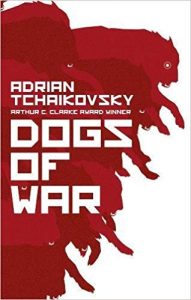 Lucy Nield: In an interview with Three Crows Magazine (2018), you stated that Dogs of War is one of your ‘favourites,’ is this still true? And why?
Lucy Nield: In an interview with Three Crows Magazine (2018), you stated that Dogs of War is one of your ‘favourites,’ is this still true? And why?
Adrian Tchaikovsky: It really is, and I think Bear Head, the sequel, works extremely well too (if I do say so myself). I think what I manage to do is balance three things, all of which are very important to the Science Fiction Narrative; it’s got interesting actual speculative science, it’s got social impact of science (which I always feel is where Science Fiction’s strongest suit honestly is, rather than the technology) and also I think it’s got the human interest story element that you need, to convey all of the science in a way that people care about; even though the majority of the characters aren’t actually ‘human.’ All Science Fiction books have those elements in either lesser or greater quantities, but for whatever reason in Dogs of War there is a neat balance between the three.
LN: Absolutely, I couldn’t agree more, and what you have just said there, that a lot of the characters aren’t actually human is interesting because they appear so achingly human, and you can empathise and anthropomorphise with them easily. Sometimes you do forget that they are not human. We all know they are Bioforms, but we can connect with Rex and the others quite easily…
AT: *agrees*
LN: which leads me to Rex … I heard a rumour, that you don’t actually like Dogs?
AT: When I was a kid I had almost like a phobia level response to dogs, specifically to the sound of barking dogs.
It is possibly because when I was very young the neighbour, next door, had an extremely aggressive dog that used to try and get through the fence all the time, but that is one of the things I have been told, I don’t have any memory of that myself, so it may or may not be the reason.
Weirdly enough at the first law firm I worked in, when I went into law, there was some partners who would just bring their dogs into the office, and they would just roam around. So, I had to get over my aversion to dogs and that did the trick… one of the other things I had a real problem with as a kid was wasps, because I had a fairly traumatic wasp related incident, which has also turned up in my books. I think, possibly, I am using writing as a successful exorcism of things that have bothered me in the past.
LN: How did you manage to write such an uncannily familiar character as Rex without a deep, nostalgic bond or love for dogs?
AT: Some of my closest friends and my fellow writer Janine Ashbless, who I have collaborated with a couple of times [The Private Life of Elder Things, 2016], are very big dog people and when we go round there, they’ve always got three or four dogs in the place. Knowing someone who is very passionate about dogs was probably essential to writing Dogs of War, because I think without them, I wouldn’t have been able to master the sympathy for Rex as a character and for dogs in general.
I had also done quite a lot of research on the history of domestication. There has been a fair amount of current research on dog-cognition and the way dogs’ brains work. Which is really fascinating. It helped me to like dogs in the abstract, even if I wasn’t necessarily committed to dogs, or any particular dog.
LN: An appreciation for them now.. as long as they are over there!
AT: Yes, Yeah.
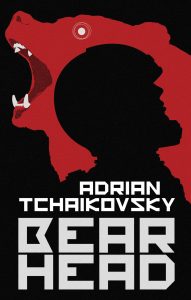 LN: You mentioned that you use to work in law, do you think of yourself as Aslan? (Rex’s Lawyer in Dogs of War who also makes an appearance in Bear Head)
LN: You mentioned that you use to work in law, do you think of yourself as Aslan? (Rex’s Lawyer in Dogs of War who also makes an appearance in Bear Head)
AT: I don’t think so.. I suspect that various more senior lawyers I have known have contributed to that.. writing a lawyer character is something I have done before, the main character in Shards of Earth is a lawyer but writing positive lawyer characters (because they get such terrible press) would be quite a pleasant thing to do, and so you have Aslan who is a genuinely principled lawyer character and Kris in Shards of Earth.
LN : and the name Aslan… an allusion to The Lion, Witch and Wardrobe?
AT: It is my own personal joke that all of the human characters in both Dogs of War and Bear Head, are named after animals in some way, and it can be a bit deeply buried. So Aslan is Aslan. But then you have Hart.. and you have Murray who of course is the ‘Moray of Campeche,’ and every single other major human character in both books is named after an animal and it is not necessarily a particularly symbolic animal for them but there is always an animal there if you dig deep enough.
LN: So, with Bear Head’s Jimmy…
AT: Jimmy Marten… Marten is a little stoat or a weasel…
LN: I was thinking like Martin… Martian.. because they are on Mars…
AT: I would love to be able to take credit for that one, that’s a whole extra level of fun but that is entirely serendipitous, I think.
LN: Thinking about the relationships, throughout Dogs of War there does seem to be a conscious attempt to confront and challenge stereotypical anthropocentric attitudes towards animals, so humans over animals, was this a conscious choice and what was it a stab at?
AT: It absolutely was that, I studied psychology at university and there was a big behavioural component to a lot of the lectures, and the animal behavioural component was very Skinner-ian, and that was the dominant paradigm of animal behaviour studies at the time. Which works out as ‘animals are biological robots, they don’t really think, they don’t really feel,’ which is a very convenient belief if you want to, for example, experiment on them. Frankly, from what I recall, I think animal psychologist B. F. Skinner was also fairly convinced that people were pretty much the same and no one really thought or felt, accept possibly him, but one of the things I am aware of from researching since is that the field has moved on since then. Which is a joy. But I got incredibly frustrated with this extremely reductionist attitude that you can’t possibly say that an animal feels a thing or thinks something, or anything you can just describe what it does.
One of the interesting things that came up in the Spider research for Children of Time is that even the behaviour of what should be relatively simple animals, like the jumping spiders or a crab for example, has a more complex life than we previously thought. A crab’s neurology may be much simpler than something like an insect, and we don’t generally think of insects as great thinkers, but crabs have complicated behaviours and social lives which is only really coming out now, because everyone had assumed that they are basically little robots following very simple programming and therefore, for a long time, no one really studied them (the research never got as far as me anyway, I might have overlooked something).
To a certain extent what I am doing in Dogs of War is looking at human-animal relationships and I am also absolutely looking at human-human relationships, because the way that the Bioforms are treated is: if you have a convenient reason to assign this particular group into a lesser category, then it becomes very convenient for you to get this group to do all sorts of things that you don’t want ‘people’ to do, and you could also, like with the Bioforms, if you have that group do something horrible at your orders you can then say ‘oh, look at the horrible thing that they have done,’ then just have them destroyed, or some other way of distancing yourself from doing the terrible thing.
This is something we have historically done and continue to do with people. I suppose I am blurring the lines between animals and people in creating the Bioforms, which are both, so I can look at the way we treat animals and the way we treat people who we do not want to think of as people in a similar way.
LN: I suppose that becomes clearer at the end of the text, with Morrow?
AT: Ah yes, the company is another one of my attempts to amuse myself, Morrow Incorporated.
LN: Ah of course. I think the connections to H.G. Wells’ The Island of Dr Moreau are clear.
AT: Ah yes, that is the root text that Dogs of War grows out of. Weirdly enough, I don’t know if it’s an anniversary or something but there seems to be a whole load of Dr Moreau themed books out on the market in the last few months. Such as J.S Barns City of DR Moreau, Darryl Gregory Album of DR Moreau and Lauren Jean Mckay’s Animals in that Country, to name a few!
LN: Yes and Craig Dilouie One of Us might be another, so were some of these texts your lockdown readings?
AT: Well I read Animals in that Country because it was the Clarkes Award Winner and I loved that book. It is bludgeoningly traumatic to read, but very good.
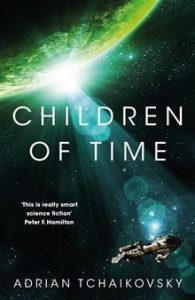 LN: So, thinking about emotions evoked by these texts, I understand that one of the lessons from Children of Time is about empathy and ‘having empathy for things that are different from us’ (Three Crows Magazine, 2018), so using Octopi and Spiders is a brilliant way to engender this as they are not very humanoid, they are not very familial, so many people are disturbed by tentacles and the extra legs; what was the main lesson in Dogs of War?
LN: So, thinking about emotions evoked by these texts, I understand that one of the lessons from Children of Time is about empathy and ‘having empathy for things that are different from us’ (Three Crows Magazine, 2018), so using Octopi and Spiders is a brilliant way to engender this as they are not very humanoid, they are not very familial, so many people are disturbed by tentacles and the extra legs; what was the main lesson in Dogs of War?
AT: From the point of view of writing it and the fun I had writing it, it’s very much just getting behind someone who is human adjacent, but definitely not human, and certainly more human that the Portia spiders in Children of Time. But also because it’s first person, and because we are limited to his perspective, for at least part of the book you get a much more detailed breakdown of what it is like to be Rex, and that also changes as he grows and adapts throughout the book. That very limited flawed narrator viewpoint. Also, especially in the earlier section with Rex, I get to do what is always one of the joys of a first-person narration, which is being able to leapfrog over the narrator character, so that I (as an author) know what’s going on and from context the readers know what is going on, but Rex doesn’t know what’s going on. The fact you can see how out of his depth he is and how little he understands the uses he is being put to in the early stages of the book really helps to bring him out as a sympathetic character even though he is doing terrible things.
LN: It must have been quite hard to portray that, because throughout the text he is seen externally as a monster, and humans are scared of him, but because we have started the text with him, with those lines ‘I am Rex and I am a Good Dog,’ we instantly feel he is being infantilized, he is very naïve and he doesn’t know what’s going on and he just wants to make his master happy. That contrast: the image of the beast, the killer, juxtaposed with the image of a little puppy dog who just wants to be loved, was this difficult?
AT: It seemed to come very naturally, one of the things I can do as a writer is get myself behind the eyes of things that aren’t human, and to a certain extent there is a certain architype we’re used to there and it’s kind of ‘Lenny-from-of-mice-and-men’ it’s ‘the-incredible-hulk,’ that combination of a threat and naivety, it is something I build on an established tradition with. The difference there is that the naivety of Rex is purely due to the fact he has been kept in the dark, it is not because he is innately simple – perhaps in the way that Lenny is portrayed. With Rex it is purely – yes he has been infantilized and locked into this enforced value system of whether his Master says he is good or not, so he spends the book (when he unshackles himself from the hardware) breaking free, because it is a part of the way he thinks even when the external shackles of this are gone.
LN: Absolutely, like when you take a lead off a dog, and they will still stand right next to you because they are conditioned to walk beside you.
So, thinking about Rex, and his feelings surrounding Master and how he has been designed and trained to behave, do you think loyalty plays a huge part in the texts?
AT: In Dogs of War, loyalty is a central concept, and I suppose the book does not come down particularly in favour of loyalty. It is more to do with the fact that loyalty is a very easy lever to make people do bad things for you, and you can extend these things out to patriotism, nationalism, and religious faith, anything really where people are demanding your obedience, without really demanding your examination of what it is you are obedient to. Which is absolutely that man-dog relationship. Is the dog a good dog if it has just torn the throat out of a protester at the commands of the police dog handling team? From the point of view between the handler and the dog, then probably yes, unless of course you want to blame the dog at which point, suddenly it was bad dog. What the dog has done has not in any way changed. It is entirely the interpretation of external forces that decide whether it was a good or a bad thing for the dog to do. The point really is: uninformed loyalty to anything, as far as the book is concerned, is not a good thing. That is the lesson Rex has got to work out, what does he want to be loyal to based on his own informed choice.
LN: For Rex this is certainly a challenge as he doesn’t want to make choices.
AT: At the point where Rex is working his way through a series of logical and intellectual runs that people have a great deal of difficulty with, it is much easier to just decide you are going to be loyal to a thing and not have to worry about what it is that, that thing stands for. It’s much less mentally taxing to pick a side.
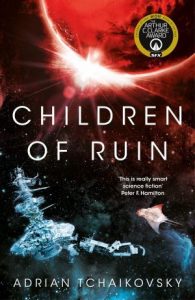 LN: And we see that ‘picking a side’ in Bear Head, where the dogs choose to have the ‘Collaring’ and behave on behalf of Master, even when they do not like what they are being told to do, they still do it because they have CHOSEN to be ‘loyal’.
LN: And we see that ‘picking a side’ in Bear Head, where the dogs choose to have the ‘Collaring’ and behave on behalf of Master, even when they do not like what they are being told to do, they still do it because they have CHOSEN to be ‘loyal’.
AT: The dog religion, in Bear Head, came out of nowhere. The chapter where the dogs explain what they believe to Honey tumbled out onto the page as I wrote it, and it just made so much terrifying sense. I just knew the characters would have a conversation at that time, and that is just where the conversation went. Suddenly, there was a completely coherent, but left field ideology that wasn’t there before. You assume that it is all just about loyalty and doing as you are told, but no they have a very deep and complex theology as to why they are doing all these things that just looks like slavish obedience.
LN: In Dogs of War, as far as I could glean, all the dog-forms/dog Bioforms, are male.
AT: Oh, that is an interesting thought.
LN: And in Bear Head, we are introduced to Dina, who is female. I wonder if gender and sex is something you consciously considered?
AT: Ok, this is going to be fairly POST-FACTO, what I suspect I was thinking about, was at the time of Dogs of War, and REX, it is a primarily military project that is creating the Bioforms, and those responsible for building these believe ‘you want male dogs, which are more aggressive.’ The main female member of the group is Honey, and if you think ‘who is the most ferocious between male and female bears?’ the she-bear is the archetype of the ‘ferocious bear,’ rather than the male bear.
LN: and are Bees she/her?
AT: Arguably they are a they, who are also feminine.
LN: Ah, because of Queen Bee?
AT: With insects it is a bit of a different deal anyway, gender doesn’t work in the same way it does with mammals. I cannot promise this was my thinking at the time of writing it, it may simply have been that I just thought of big angry dogs as male and that is a bit of an atavistic response from me. In Bear Head, Bioforms have been around for longer, and it makes more sense that you are going to be less restricted by that single line of thought.
LN: Bear Head came to you in a dream.. which part?
AT: About two thirds of the book just turned up, ready to be made, and this has never happened to me before or since. But the whole business of Mars, and the set up with Thompson was all there, some of the jigsaw pieces had to be shuffled around to make sense, but in general it came out remarkably well and jumped to the top of the queue of what I was writing next.
LN: How did you keep track of who had what level of modification in each text? Was this planned out meticulously or was this a challenge?
AT: I think they fall into a fairly small number of categories to be honest; you have Earth Bioforms, Martian Bioforms, you have the Martian humani-forms or even Bioforms on Mars and then you have got this fairly small number of things like the security ‘Bad News Bears,’ which are just leashed animals with a control chip.. and then Bees, who are very much their own category. And HuMos!
LN: I have noticed that you and author Adam Roberts, talk on social media. Were you influenced at all by the ‘chipped’ dog characters in his novel ‘Bete,’ when writing Rex and his fellow Bioforms?
AT: Not consciously, I guess I would have probably read it a year or so before I wrote Dogs of War. So, it will have been rattling about in my head. To a certain extent there’s a common archetype of how one would think a dog would talk. It is definitely another text, on that long strand of DNA from H.G. Wells, that is looking at that same kind of relationship and topic.
LN: So, thinking about other contemporary authors who deal with dogs in SSF, have you read any Paolo Bacigalupi?
AT: Yes, I am very fond of his work, and he also has dogs, and although I wasn’t consciously drawing on it his engineered dogs (Augments) from the Ship Breaker Series, must have fed into my melting pot.
LN: There are dramatic differences between Rex and Tool (Bacigalupi’s dog character), as Augments and Bioforms are designed differently, and the narratives differ drastically.
AT: I do not think they would get on if they met.
LN: I completely agree!
Many Bioforms / Dog-hybrids / Augments within SSF appear to have a strained relationship with humans, they either do not like or trust people (like Bacigalupi’s Tool). Rex is the main Dog that seems to keep that love, and almost expected, familial doggy attitude that you can imagine a dog would have. Throughout the text he starts to learn how he has been used, abused and controlled and he yet still likes people. Why does Rex keep the love?
AT: To a certain extent, this would be a massively different book if he had gone the other way, if he had just led the revolution, or something like that. Which would have been a potentially valid decision for him to make, but also, one of the things that really struck me from my dog-cognition research was this idea that through fifteen thousand years of rapidly accelerated evolution, dogs had been adapted for an environment that is ‘us.’ Dogs have evolved to fit in with us, and I think it would be relatively difficult to imagine a dog that completely severed itself from people. Even if you have a character like Bacigalupi’s Tool, you have a character who is, to a certain extent, defined by their relationship to humanity even if it has become entirely an antagonistic one. Also, of course, the first half of Dogs of War is concerned mainly with the dynamics of Rex and his squad, and their different attitudes, so you have Honey, who’s attitude is effectively very well informed and intelligent, and her attitude towards humanity is that humanity is an environment that you need to survive in, and is potentially a tool you can use. The main counterpoint to Rex is Dragon, who does not like people, and doesn’t want to do things people want, playing the wicked angel throughout. As well as being an obvious, ominous presence and looking scary. So, Rex had to be the one that still felt that pull of humanity, and working with humanity.
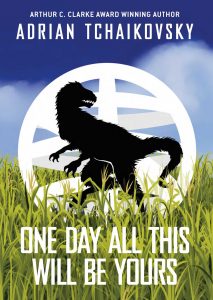 LN: I absolutely loved, One Day This Will All Be Yours, I was blown away because I did not know what to expect when I opened the book. I am unsure how long I was reading it, until I realised that Miffly was in fact a dinosaur.
LN: I absolutely loved, One Day This Will All Be Yours, I was blown away because I did not know what to expect when I opened the book. I am unsure how long I was reading it, until I realised that Miffly was in fact a dinosaur.
AT: I dropped it at the end of the first chapter. I am very deliberately keeping the precise nature of Miffly ambiguous, if you are just reading without analysing, you are just like ‘yes, Miffly is a dog,’ because Miffly is being described in dog-like or pet-like ways, doing dog-like things and behaving in this way, then you find out that the general terrible-ness of the main character includes a terrible taste in pets.
I just wanted to write a book about the worst possible time traveller, and I think this was a reasonable contender.
LN: You write a lot of speculative futures, and your readers are offered the opportunity to explore familial near futures, as well as these terrifyingly far-futured worlds such as the Children of Series: what fears do you have of the future of humanity that might have leaked into your texts?
AT: Honestly, my fears for the future are all entirely based on the way that we, as a species, are going to screw it up. Most especially the ways in which we are going to destroy the natural world, and the only planet we know of that has a natural world. Especially insects, but the animal world in general suffuses pretty much everything I have written and to a certain extent everything I have written is a eulogy for all the things that were on the brink of being driven to extinction. And I think driven to extinction by human stupidity and human selfishness. The future I am seeing is that we are going to destroy our own civilisation, but we will make sure to destroy everything else first.
Firewalkers is honestly the book where this comes out most clearly. Ironclads, Firewalkers and upcoming book Ogres, are very much my fairly barbed take on where I see humans taking the future.
LN: ‘Ogres are bigger than you, Ogres are stronger than you, Ogres rule the world,’ – Tell us more about your upcoming book Ogres!
AT: I am limited to what I can say about it! Because it has got some early reveals that switch up what is going on, but it is set in a pleasant little rural community, where the main character is a son of the local head man, and he is a bit of a rascal, and he goes off to have fun with the outlaws in the wood. Then the landlords turn up, and the landlords are Ogres. They are Ogres in an eighteenth-century Landowner sense.
LN: So, when is Ogres set?
AT: Well, that is the thing.. because they also turn up in a car, a possibly modern or futuristic car. So, when is it? And what is going on? Those are very much the questions… It is absolutely a piece of Science Fiction, and it is absolutely looking at a lot of the same themes as Ironclads and Firewalkers. The three texts make a conceptional trilogy, In the same way as One Day this will all be yours, Walking to Aldebaran and my other upcoming rebellion novella which is currently titled Put Away Childish things, which is a conceptional trilogy about people getting stuck in terribly lonely places.
LN: In a conversation with Arley Sorg, for the Clarkes World Magazine (Aug, 2021), you mentioned that the third Children Of… book will materialise at some point…
AT: Yeah, that is written and delivered. I imagine the earliest we will see it will be the end of 2022 after the second book of the Final Architecture series and before the third, which I think is the order things will come out in. It is at least theoretically called Children of Memory.
LN: With Children of Memory, I imagine you are keeping everything really close to your chest, but we have had arachnids, we have had octopi, what many legged creature might we or might we not see in the next text?
AT: Actually, we are going for even fewer legs that normal. So, at the end of Children of Ruin, there is a mention of uplifted corvids, so they do form at least a part of Children of Memory.
LN: My dad is a huge fan of yours. Thanks to my recommendations of course, he had a few questions. Do you mind?
AT: Of course not!
Duncan Nield: What is your typical day?
AT: After I have dropped my son off at school, I write in the mornings, and I am usually done with my days writing by lunch time. If I am particularly driven, usually towards the end of a project I’ll also write in the afternoons, evening and weekends, but usually by lunch I need some time to let my mind sit on things for a bit and then I will be good to go the next day. Afternoon might be editing, admin.. etc. Most of my writing is very meticulously planned, I will work out the world, then the chapter plan, and then I will usually section off my chapters so I always know what is going to happen next and I can just sit down in the morning, and it will be ready to go.
DN: Shadows of the Apt series – Which Kinden would you be and why?
You always want to be a mantis Kinden, because they are terribly dashing and tragic and so forth, but I know I am a beetle Kinden and just plod on with things, one step at a time.
DN/LN: Are there any plans to make a Shadows series? I have heard Whispers that Children of Time was possibly an option, so are any of your texts an option for film or TV right now?
AT: We seem to be constantly talking to people regarding several books, Children of Time had a film option which has been and gone, and now we are in talks again, Children of Time is a difficult project, you would have to be careful to produce something watchable that still retained anything of the original feel for the book, but it is also one of the most well-known of my books, and therefore it tends to be the one that people go to. Shadows would be a very hard one to film, because there are two or three key assumptions of the world that are not in any way intuitive, but you must get your head around to make any sense of why the world is like it is and what is going on. Which would be a challenge to translate from text to film, so Shadow of the Apt would be a tough one. I think Dogs of War would quite a good one to change from text to screen. Interestingly, Dogs of War came out to very little response at the time, but after the Children books it is my most translated book, which as it is one of my favourites is delightful that it is getting out into the world.
Thank you, Adrian Tchaikovsky, for talking with us!
Adrian Tchaikovsky is the award-winning author of Children of Time and the Shadows of the Apt series. His novel, Ogres will be available in March 2022!
